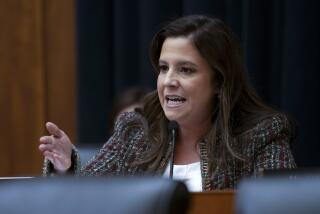Israel’s Eban Urges Talks With Arabs
- Share via
THE HAGUE — Abba Eban, the former Israeli foreign minister, urged Tuesday that Israeli officials meet with Palestinian leaders in an effort to end the Palestinian uprising in the occupied West Bank and Gaza Strip.
Eban spoke at a private conference here, set up by the Netherlands-based Middle East Dialogues organization, on the Israeli-Palestinian problem. He did not refer to the Palestine Liberation Organization by name, but several PLO officials were present.
He said the United States, which recently began a dialogue with PLO officials, should have made the contact sooner. He criticized the “curious mystique of avoiding contact” with antagonists.
Washington, Eban said, had “weakened its influence and position” in the Middle East by “refusing to explore the Palestinian reality.” But now, he said, Washington has “happily abandoned that policy,” and he added, “Better late than never.”
Afterward, Eban shrugged off the possibility that he could be charged with breaking an Israeli law that forbids Israeli officials to contact members of the PLO because it is considered a terrorist group.
Eban was foreign minister in a number of Labor Party governments. In recent years he has been something of a prophet without honor in Israel, cast into the political wilderness and denied the seat he held for years in the Knesset, or Parliament.
Also attending the conference were Ran Cohen, a colonel in the Israeli army reserve and a left-wing member of the Knesset, and Meis Pail, a retired colonel and former Knesset member.
Among the Palestinians in attendance were Bassam abu Sharif, a spokesman for PLO leader Yasser Arafat; Hanna Siniora, editor of the pro-PLO East Jerusalem newspaper Al Fajr; Sari Nusseibeh, a professor at Birzeit University in the West Bank town of Ramallah, and the PLO’s representatives to the Netherlands and the European Community.
Eban told the conference that the intifada , as the Palestinian uprising is called in Arabic, is damaging Israel’s international image. He said it represents “the kind of situation any rational statesmanship would replace with a new regional order.”
The Palestinians need a state of their own, he said, one that could “coexist side by side” with Israel.
Eban said that the Israeli-Egyptian peace treaty of 1979 was “one of the momentous events” in Middle East history and shows that “irreconcilable conflict” is not inevitable.
Abu Sharif, the PLO spokesman, said he hopes that the United States will help show Israeli Prime Minister Yitzhak Shamir that there is no way to end the intifada except “to sit down and talk.”
He said the PLO is prepared to enter negotiations for a peace settlement with “no preconditions.”
Otherwise, Abu Sharif warned, the uprising in the occupied territories will continue, because the Palestinians are “not going to accept slavery.”
He called on the Israelis to “lay down their arms to make peace.”
A major purpose of the conference is to develop, through an Israeli-Palestinian dialogue, ideas on the sort of contribution the Common Market can make to help solve the problem.
An Egyptian diplomat, Tahsin Basheer, complained that European countries “cared more about human rights in Afghanistan” than in the occupied territories.
“We all have to work hard to reach the goal of peace,” Basheer said, “before the next war.”
More to Read
Sign up for Essential California
The most important California stories and recommendations in your inbox every morning.
You may occasionally receive promotional content from the Los Angeles Times.













